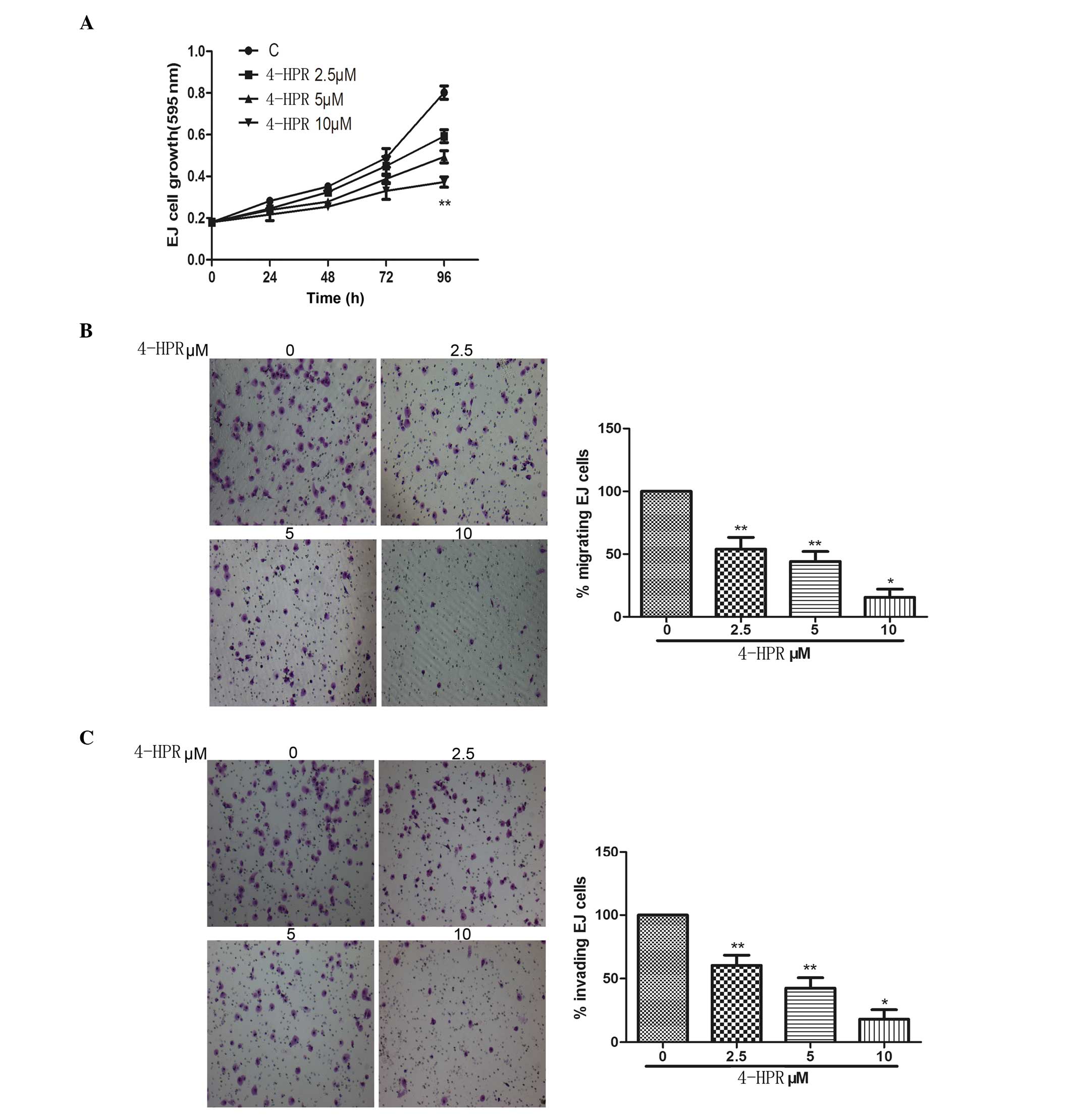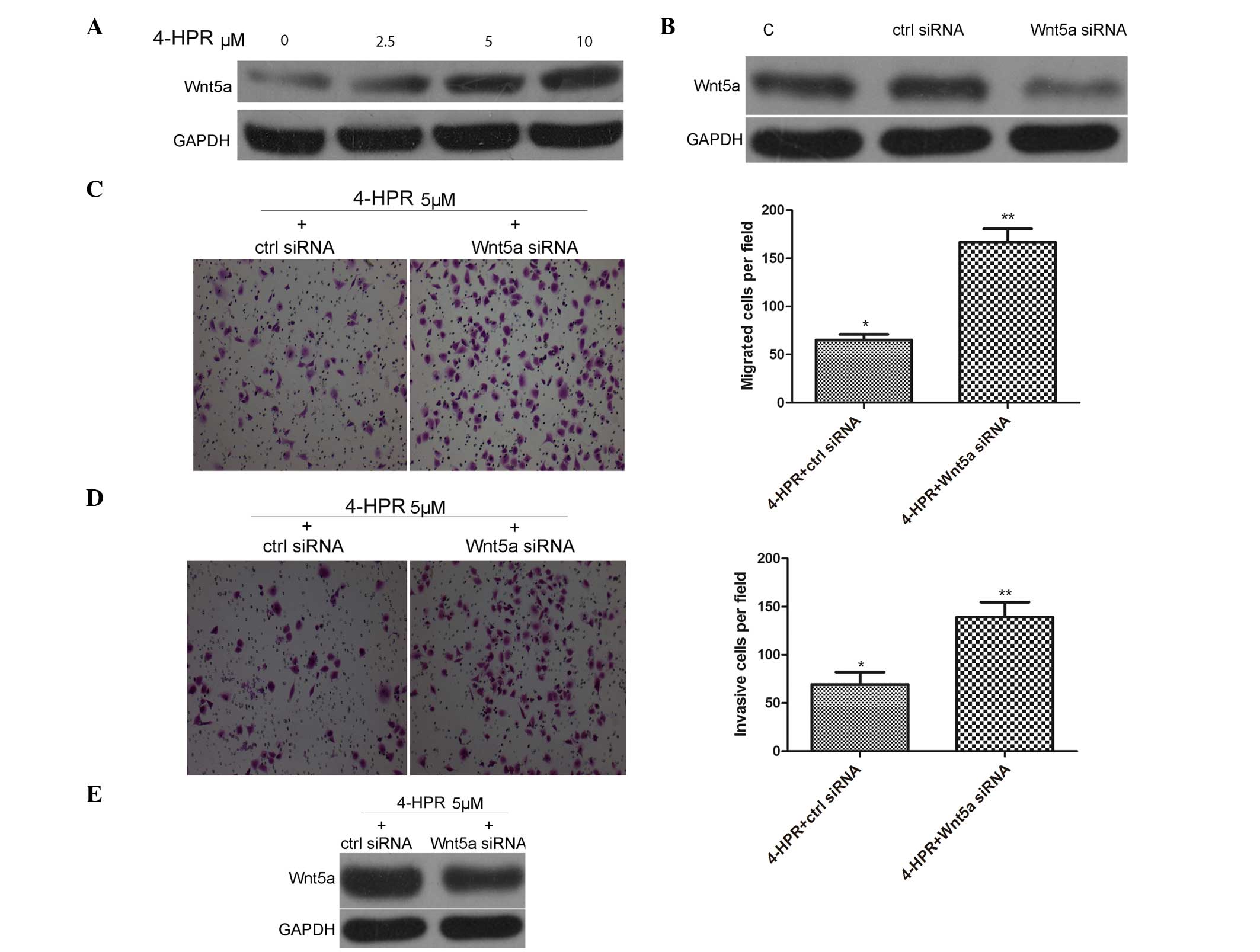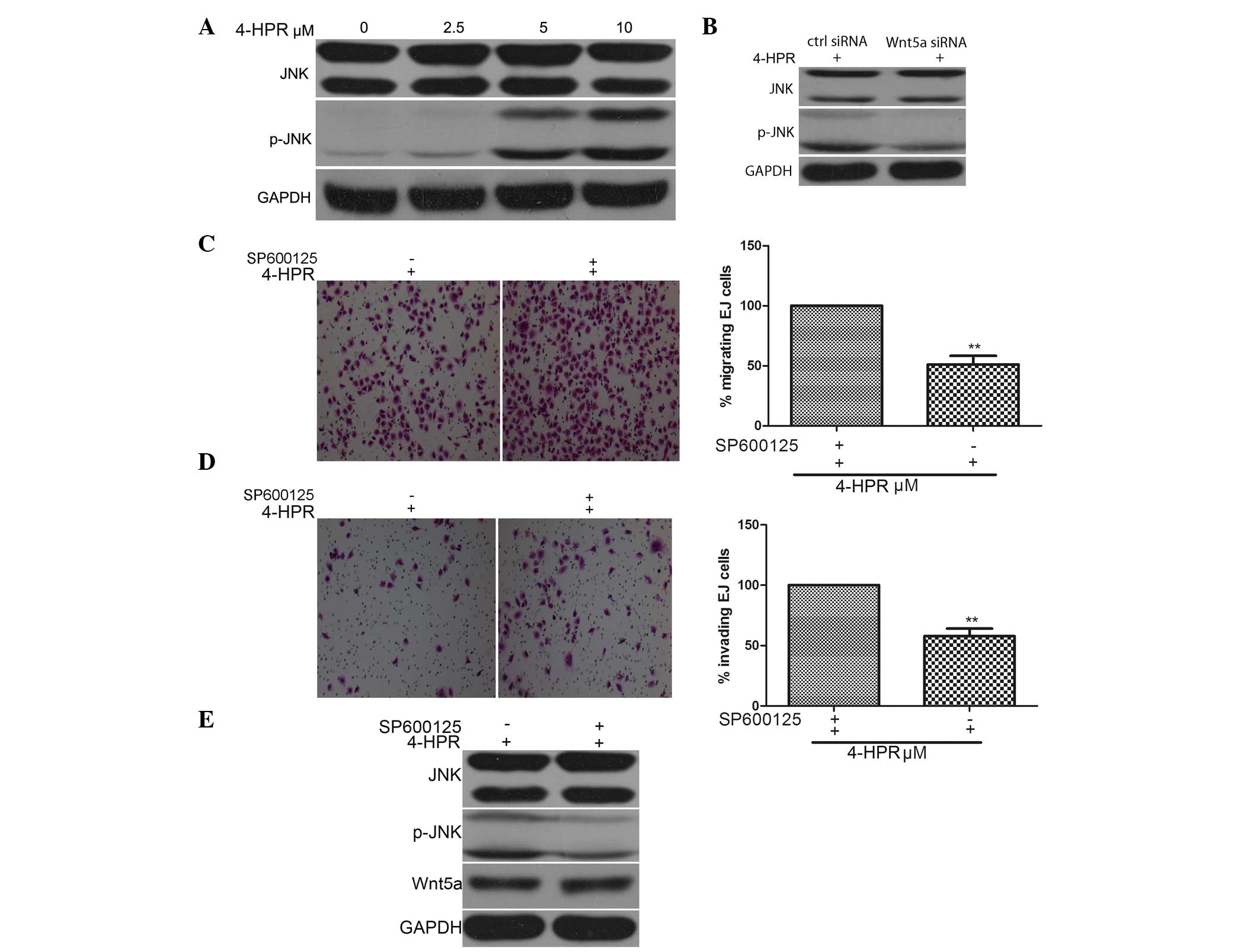|
1
|
Siegel R, Naishadham D and Jemal A: Cancer
statistics, 2012. CA Cancer J Clin. 62:10–29. 2012. View Article : Google Scholar : PubMed/NCBI
|
|
2
|
Sievert KD, Amend B, Nagele U, Schilling
D, Bedke J, Horstmann M, Hennenlotter J, Kruck S and Stenzl A:
Economic aspects of bladder cancer: What are the benefits and
costs? World J Urol. 27:295–300. 2009. View Article : Google Scholar : PubMed/NCBI
|
|
3
|
Babjuk M, Oosterlinck W, Sylvester R,
Kaasinen E, Böhle A, Palou-Redorta J and Rouprêt M: European
Association of Urology (EAU): EAU guidelines on non-muscle-invasive
urothelial carcinoma of the bladder, the 2011 update. Eur Urol.
59:997–1008. 2011. View Article : Google Scholar : PubMed/NCBI
|
|
4
|
Dowlatshahi K, Mehta RG, Thomas CF, Dinger
NM and Moon RC: Therapeutic effect of N-(4-hydroxyphenyl)
retinamide on N-methyl-N-nitrosourea-induced rat mammary cancer.
Cancer Lett. 47:187–192. 1989. View Article : Google Scholar : PubMed/NCBI
|
|
5
|
Formelli F and Cleris L: Synthetic
retinoid fenretinide is effective against a human ovarian carcinoma
xenograft and potentiates cisplatin activity. Cancer Res.
53:5374–5376. 1993.PubMed/NCBI
|
|
6
|
Pollard M and Luckert PH: The inhibitory
effect of 4-hydroxyphenyl retinamide (4-HPR) on metastasis of
prostate adenocarcinoma-III cells in Lobund-Wistar rats. Cancer
Lett. 59:159–163. 1991. View Article : Google Scholar : PubMed/NCBI
|
|
7
|
Kurie JM1, Lee JS, Khuri FR, Mao L, Morice
RC, Lee JJ, Walsh GL, Broxson A, Lippman SM, Ro JY, et al:
N-(4-hydroxyphenyl)retinamide in the chemoprevention of squamous
metaplasia and dysplasia of the bronchial epithelium. Clin Cancer
Res. 6:2973–2979. 2000.PubMed/NCBI
|
|
8
|
Costa A, Formelli F, Chiesa F, Decensi A,
De Palo G and Veronesi U: Prospects of chemoprevention of human
cancers with the synthetic retinoid fenretinide. Cancer Res. 54(7
Suppl): 2032s–2037s. 1994.PubMed/NCBI
|
|
9
|
Stamenkovic I: Matrix metalloproteinases
in tumor invasion and metastasis. Semin Cancer Biol. 10:415–433.
2000. View Article : Google Scholar : PubMed/NCBI
|
|
10
|
Basset P, Okada A, Chenard MP, Kannan R,
Stoll I, Anglard P, Bellocq JP and Rio MC: Matrix
metalloproteinases as stromal effectors of human carcinoma
progression: Therapeutic implications. Matrix Biol. 15:535–541.
1997. View Article : Google Scholar : PubMed/NCBI
|
|
11
|
Johnsen M, Lund LR, Rømer J, Almholt K and
Danø K: Cancer invasion and tissue remodeling: Common themes in
proteolytic matrix degradation. Curr Opin Cell Biol. 10:667–671.
1998. View Article : Google Scholar : PubMed/NCBI
|
|
12
|
Egeblad M and Werb Z: New functions for
the matrix metalloproteinases in cancer progression. Nat Rev
Cancer. 2:161–174. 2002. View
Article : Google Scholar : PubMed/NCBI
|
|
13
|
Srivastava P, Kapoor R and Mittal RD:
Association of single nucleotide polymorphisms in promoter of
matrix metalloproteinase-2, 8 genes with bladder cancer risk in
Northern India. Urol Oncol. 31:247–254. 2013. View Article : Google Scholar : PubMed/NCBI
|
|
14
|
Shan Y, Zhang L, Bao Y, Li B, He C, Gao M,
Feng X, Xu W, Zhang X and Wang S: Epithelial-mesenchymal
transition, a novel target of sulforaphane via COX-2/MMP2, 9/Snail,
ZEB1 and miR-200c/ZEB1 pathways in human bladder cancer cells. J
Nutr Biochem. 24:1062–1069. 2013. View Article : Google Scholar : PubMed/NCBI
|
|
15
|
Logan CY and Nusse R: The Wnt signaling
pathway in development and disease. Annu Rev Cell Dev Biol.
20:781–810. 2004. View Article : Google Scholar : PubMed/NCBI
|
|
16
|
Wong GT, Gavin BJ and McMahon AP:
Differential transformation of mammary epithelial cells by Wnt
genes. Mol Cell Biol. 14:6278–6286. 1994. View Article : Google Scholar : PubMed/NCBI
|
|
17
|
Nishita M, Enomoto M, Yamagata K and
Minami Y: Cell/tissue-tropic functions of Wnt5a signaling in normal
and cancer cells. Trends Cell Biol. 20:346–354. 2010. View Article : Google Scholar : PubMed/NCBI
|
|
18
|
Oishi I, Suzuki H, Onishi N, Takada R,
Kani S, Ohkawara B, Koshida I, Suzuki K, Yamada G, Schwabe GC, et
al: The receptor tyrosine kinase Ror2 is involved in non-canonical
Wnt5a/JNK signaling pathway. Genes Cells. 8:645–654. 2003.
View Article : Google Scholar : PubMed/NCBI
|
|
19
|
Huang C, Rajfur Z, Borchers C, Schaller MD
and Jacobson K: JNK phosphorylates paxillin and regulates cell
migration. Nature. 424:219–223. 2003. View Article : Google Scholar : PubMed/NCBI
|
|
20
|
Kikuchi A, Yamamoto H, Sato A and
Matsumoto S: Wnt5a: Its signaling, functions and implication in
diseases. Acta Physiol (Oxf). 204:17–33. 2012. View Article : Google Scholar : PubMed/NCBI
|
|
21
|
Dejmek J, Dejmek A, Säfholm A, Sjölander A
and Andersson T: Wnt-5a protein expression in primary dukes B colon
cancers identifies a subgroup of patients with good prognosis.
Cancer Res. 65:9142–9146. 2005. View Article : Google Scholar : PubMed/NCBI
|
|
22
|
Kremenevskaja N, von Wasielewski R, Rao
AS, Schöfl C, Andersson T and Brabant G: Wnt-5a has tumor
suppressor activity in thyroid carcinoma. Oncogene. 24:2144–2154.
2005. View Article : Google Scholar : PubMed/NCBI
|
|
23
|
Coussens LM and Werb Z: Matrix
metalloproteinases and the development of cancer. Chem Biol.
3:895–904. 1996. View Article : Google Scholar : PubMed/NCBI
|
|
24
|
Green A, Shilkaitis A and Christov K:
4-(hydroxyphenyl) retinamide selectively inhibits the development
and progression of ductal hyperplastic lesions and carcinoma in
situ in mammary gland. Carcinogenesis. 20:1535–1540. 1999.
View Article : Google Scholar : PubMed/NCBI
|
|
25
|
Shaker MR, Yang G, Timme TL, Park SH,
Kadmon D, Ren C, Ji X, Lee HM, Sehgal I, Anzano M, et al: Dietary
4-HPR suppresses the development of bone metastasis in vivo in a
mouse model of prostate cancer progression. Clin Exp Metastasis.
18:429–438. 2000. View Article : Google Scholar : PubMed/NCBI
|
|
26
|
Hursting SD, Perkins SN, Phang JM and
Barrett JC: Diet and cancer prevention studies in p53-deficient
mice. J Nutr. 131(11 Suppl): 3092S–3094S. 2001.PubMed/NCBI
|
|
27
|
Cai J and Jones DP: Superoxide in
apoptosis. Mitochondrial generation triggered by cytochrome c loss.
J Biol Chem. 273:11401–11404. 1998. View Article : Google Scholar : PubMed/NCBI
|
|
28
|
Levi MS, Borne RF and Williamson JS: A
review of cancer chemopreventive agents. Curr Med Chem.
8:1349–1362. 2001. View Article : Google Scholar : PubMed/NCBI
|
|
29
|
McCawley LJ and Matrisian LM: Matrix
metalloproteinases: multifunctional contributors to tumor
progression. Mol Med Today. 6:149–156. 2000. View Article : Google Scholar : PubMed/NCBI
|
|
30
|
Coussens LM, Fingleton B and Matrisian LM:
Matrix metalloproteinase inhibitors and cancer: Trials and
tribulations. Science. 295:2387–2392. 2002. View Article : Google Scholar : PubMed/NCBI
|
|
31
|
Kang H, Lee M, Choi KC, Shin DM, Ko J and
Jang SW: N-(4-hydroxyphenyl) retinamide inhibits breast cancer cell
invasion through suppressing NF-KB activation and inhibiting matrix
metalloproteinase-9 expression. J Cell Biochem. 113:2845–2855.
2012. View Article : Google Scholar : PubMed/NCBI
|
|
32
|
Nusse R: Wnt signaling in disease and in
development. Cell Res. 15:28–32. 2005. View Article : Google Scholar : PubMed/NCBI
|
|
33
|
Yamanaka H, Moriguchi T, Masuyama N,
Kusakabe M, Hanafusa H, Takada R, Takada S and Nishida E: JNK
functions in the non-canonical Wnt pathway to regulate convergent
extension movements in vertebrates. EMBO Rep. 3:69–75. 2002.
View Article : Google Scholar : PubMed/NCBI
|


















